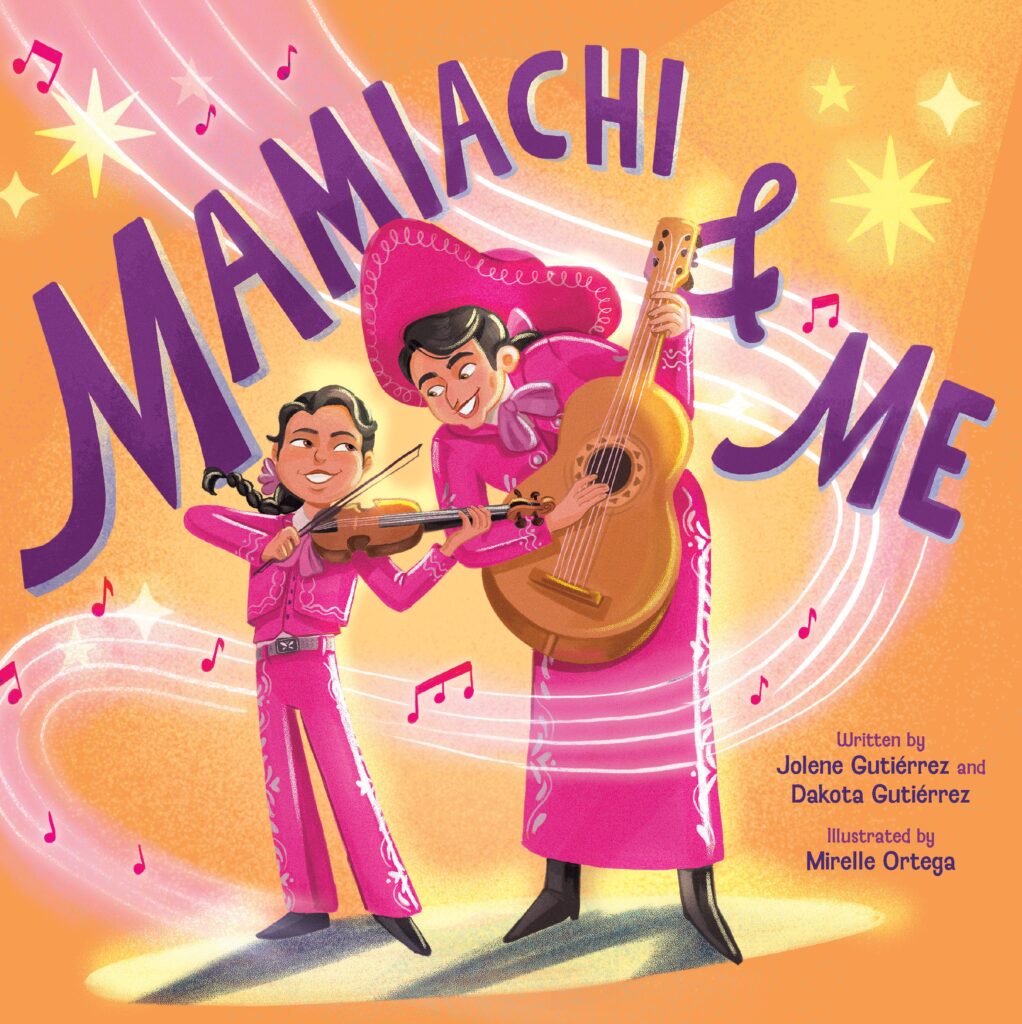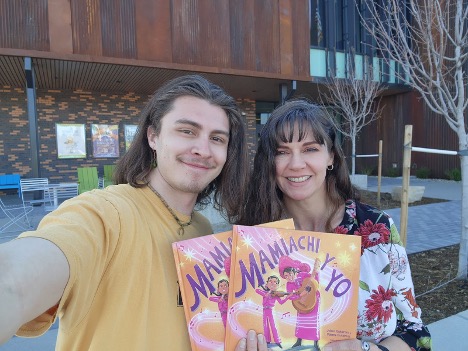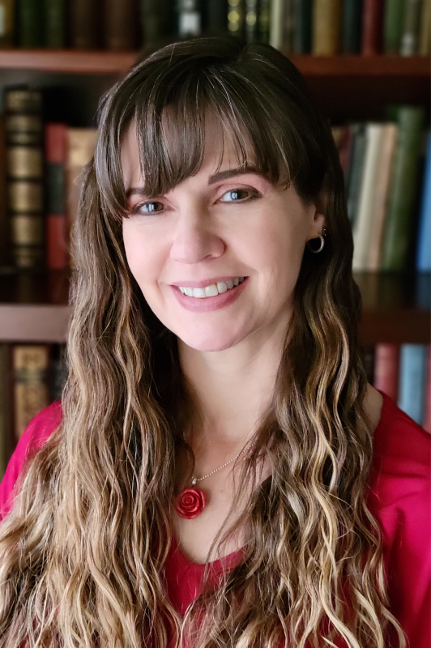
Look at that glorious cover! Doesn’t it just reach out and wrap its musical arms around you? Today I have the pleasure of interviewing co-author Jolene Gutiérrez about her new book, MAMIACHI & ME. Here’s the publisher’s description:
Mamiachi & Me is a lyrical and empowering picture book written by Jolene and Dakota Gutiérrez and illustrated by Mirelle Ortega, winner of a Pura Belpré Illustrator Honor, about what it means to be a mariachi in an all‑female band.
Today’s the day! Rosa will take the stage next to her mami and play along with her popular mariachi band. But as they fasten the shiny botonaduras and tie the moños on their charra suits, Rosa begins to worry. What if the audience doesn’t like her? Is she ready to perform?
With her mamiachi and madrinas by her side, Rosa’s stage fright is soothed away by the sound of trumpets, guitars, and violins. Centering on the power of sisterhood, community, and music, the warm and lively text by mother-and-son writing duo Jolene and Dakota Gutiérrez—joined by Mirelle Ortega’s beautiful illustrations—provides a unique perspective to the male-dominated world of mariachi.
Back matter includes additional context on the history of the beloved Mexican tradition and the rise of all-female mariachi groups, as well as a glossary, a bibliography, further reading, and a fun, detailed look at a mariachi’s signature charro suit!
Andrea: Hi, Jolene! Thanks so much for stopping by Picture Book Builders to chat about your newest picture book, Mamiachi & Me! I love this story about young Rosa following in her mom’s footsteps to become a mariachi, which has traditionally been a male-dominated musical style. Can you tell us what inspired you and your co-author to write this story?
Jolene: Hi, Andrea! Thank you so much for having me! During the pandemic, our family was fortunate to be home together: my husband and I were working from home and our kids were learning from home. One day, my husband mentioned an NPR piece about an all-female mariachi band. I thought he said “mamiachi band.” The Spanish version of mommy is mami, so I thought my husband was creating a punny word. I said, “Wait. Did you just say mamiachi?” He said, “No…” My brain couldn’t let go of that word, though, because I thought it would be the perfect word for a little girl to call her mariachi-playing mami. The pandemic meant that my son Dakota wouldn’t get to audition for his school’s mariachi band during his senior year of high school, so I asked if he’d like to work with me on a story about an all-female mariachi group and a little girl’s first time performing with her mami and mariachi madrinas. It was a way of creating something that might bring joy to others and replace some of the things he was missing.
Andrea: That’s so funny how you created the word “mariachi!” And how awesome that your co-author is your son, Dakota (although that’s a bummer about him not being able to audition for his high school mariachi band)! Actually, this is the second time you’ve co-authored with one of your children – your picture book The Ofrenda That We Built was written together with your daughter Shaian. What is it like to write with your children, and how do you all navigate the process of writing and editing?
Jolene: Working with both of my kids to create the type of books I looked for when they were babies has been the most special gift! Both of those manuscripts were written during the pandemic, and without that dedicated time together in the same house, I’m not sure if we would’ve been able to write those stories. It was amazing to work with each of them, and beautiful to see the differences in the ways they both created and edited. One of the commonalities is that we would just go to each other’s bedrooms and plop on the bed together while we read through the story and tweaked things. With Shaian and our Ofrenda manuscript, it’s a rhyming text. She’s also a musician, and her musical ear and gift for rhythm was so powerful when we worked on edits. And we worked on LOTS of edits with that manuscript. With Dakota, our story was a lyrical story that hopefully helped paint a picture with words before Mirelle Ortega’s gorgeous illustrations joined the text. Don’t tell Shaian, but the editor that Dakota and I worked with required very few edits to our text.

Andrea: I love how the text is so lyrical, utilizing a bunch of different poetic devices like alliteration, assonance, consonance, and onomatopoeia. Were you consciously trying to evoke the sound and rhythm of mariachi? Do you have a favorite line in the story?
Jolene: Oh, thank you! Yes, we were trying to incorporate the musicality of mariachi in our writing. We really wanted our lyrical language to echo the beauty and power found in many mariachi songs. When I teach students about mariachi, I tell them that I’m not totally fluent in Spanish, but even if I don’t fully understand a mariachi song, I still feel the emotions. Dakota and I were hoping that readers would connect with Rosa’s emotions in a similar manner, experiencing her feelings as we walk through this performance together. My favorite line is, “I feel like I am soaring through the melody, painting a picture with my hands and using my voice to tell our story.”

Andrea: I love that line, too! Talking about emotions, the main character, Rosa, struggles with nervousness and some stage fright before she performs. I relate to these feelings so much! Can you tell us a little bit about why you decided to use this as the main conflict and how you came up with the solution of having the other band members playing their instruments to calm and settle Rosa’s nerves?
Jolene: Dakota and I both were involved in various performing arts, so stage fright is something we know well, too! We thought it would be important for readers to see someone experiencing fear and finding the strength to overcome it. And since Rosa was surrounded by strong, artistic women and beautiful mariachi music from the time she was in utero, it made sense to us that being with her mami and madrinas and hearing them perform would bring comfort and remind her that she was in the right place at the right time.

Andrea: You often include social-emotional learning (SEL) themes in your books. Why is this important to you?
Jolene: I’ve been a teacher librarian for 30 years and a parent for 25, and I believe wholeheartedly that books help grow an understanding of self and others. I love when books give opportunities for readers to reflect, connect with what’s happening in the story, and/or to grow because of it. I think because I look for social-emotional learning opportunities when teaching and parenting, it often seeps into my writing as well.
Andrea: The illustrations by Mirelle Ortega are amazing! She conveys the flow and joy of the mariachi music so well! What was your reaction when you first saw the illustrations?
Jolene: Mirelle’s art is magical, and the first time we saw the illustrations, we were in love! The way she has shown the music flowing visually and the obvious adoration Rosa has for Mamiachi brought tears to my eyes! Mirelle’s choice of colors is so powerful, too. I love the pink, purple, and orange on the cover–I don’t think I ever would’ve thought to combine those colors, but I’m not an artist, obviously. They’re perfection!

Andrea: I agree! The whole book is perfection. Is there anything I didn’t ask you that you’d like to share with readers? If not, please tell us what your (and Dakota’s) favorite mariachi songs are and what’s next in the publishing pipeline for you!
Jolene: I really love Volver, Volver–it’s such an emotional song. This is a video of the Mariachi Mariposas performing it: https://www.youtube.com/watch?v=k7zdzOnjh7A. Mayra García, musical director of the Mariachi Mariposas, read through our Mamiachi manuscript before it was published and has cheered us on every step of the way. And Dakota grew up hearing us sing De Colores, so this is one of his favorites, performed by the Garey High School Mariachi during the pandemic: https://www.youtube.com/watch?v=nhjRAWSVArM.
I have another co-authored picture book coming in April 2026. This story is something I learned about when I spent the summer with my grandparents in southeastern Colorado. I was 12, and my grandmother told me about a Japanese American incarceration camp that was created during World War II just down the road from them. I hadn’t learned this history in my own Colorado history classes, so when I became a teacher, I taught my students about Amache, one of the ten incarceration camps created by the United States to house American citizens (unconstitutionally and without due process) during World War II. Through my work and research, I connected with a survivor of Amache, Minoru Tonai, in 2017, and we worked together to tell his story. We signed a contract for the picture book version of his story in 2023, just months before Min passed away. Min’s adult children and I have continued to work together on the book. Min was able to be a part of the illustrator selection process and chose the gifted illustrator Chris Sasaki, who has created powerful illustrations to go along with our words. I can’t wait for people to see and feel this story. I’m heartbroken that Min is gone but so, so honored that his story will live on and help others understand the injustices that happened and the long-term impacts of this history.
Andrea: Oh, that sounds like such an important and necessary story! I can’t wait to read it next year. Thanks so much for sharing about Mamiachi & Me with us, Jolene! I’m going to go watch those mariachi videos right now!

Jolene is generously giving away one copy of MAMIACHI & ME to a winner in the continental U.S. — please leave a comment below to enter. One winner will be chosen at random on July 1st.

Jolene Gutiérrez grew up on a farm in northeastern Colorado, surrounded by animals, plants, and history. She is an award-winning neurodivergent teacher librarian who has been working with neurodivergent learners since 1995. She’s a wife and a mama to two young adults, three dogs, two cats, and an ever-rotating variety of other rescue animals. Jolene is represented by agent Kaitlyn Sanchez and is a contributor to If I Could Choose a Best Day: Poems of Possibility and the author of Unbreakable: A Japanese American Family in an American Incarceration Camp (2026, co-authored with Minoru Tonai), Mamiachi and Me: My Mami’s Mariachi Band (co-authored with her son Dakota), The Ofrenda That We Built (co-authored with her daughter Shaian), Too Much! An Overwhelming Day, the Stars of Latin Pop series, Bionic Beasts: Saving Animal Lives with Artificial Flippers, Legs, and Beaks, and Mac and Cheese and the Personal Space Invader. Find her online at www.jolenegutierrez.com or on Facebook, Bluesky, Instagram, or Threads @writerjolene.

All his life, Dakota Gutiérrez has been involved in music. He’s played violin and guitar and performed in choirs and musicals. Dakota’s family has roots in Jalostotitlan, Jalisco, Mexico, where some of his favorite memories are of visiting the plaza to watch the mariachi bands perform on the weekends. Dakota is a college student at the Colorado School of Mines. He holds a Bachelor’s degree in Civil Engineering and plans to graduate with his Master’s degree in May 2026.

Wow! What a fascinating interview! I loved reading more about this beautiful book! Congratulations to all of you!
Thank you so much for reading and for your support, Angie!
Thanks so much for reading and for your kind words, Angie! I appreciate it!
What a special book – congrats to you and your coauthor. The art is also fantastic. I will certainly read this story of heritage, music, and love.
Thank you so much for reading and for your support, Claire! I love Mirelle’s art, too!
I’m emotional after reading this post because of the incredible closeness of this family. I love that mom and daughter and then mom and son used their gifts to co-author these books. As a musician myself, I’m excited to learn more about this Mexican tradition. Congratulations on your books!
Thank you so much for all of your support, Danielle! I love that you’re a musician–mariachi is such a powerful type of music!
This was such a wonderful interview! I’m looking forward to reading such a lovely story!
Thank you so much for your support, Jennifer!
Jolene, be proud! You’ve created a beautiful book!
Thank you so much, Kathy! I’m so grateful!
Just a stunning cover! Thank you for sharing!
Thank you, Katie! Mirelle’s artwork is gorgeous!
Congrats, wonderful book/s!
Thank you so much, Lynn!
Love this interview and can’t wait to read this book
Thank you so much! I appreciate your support!